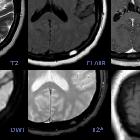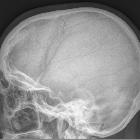Calvaria


The cranial vault, also known as the skull vault, skullcap or calvaria, is the cranial space that encases and protects the brain together with the base of the skull (chondrocranium). The cranial vault and the base of skull together form the neurocranium.
Gross anatomy
The cranial vault consists of the following flat bones:
- paired frontal bones
- paired parietal bones
- the squamous part of the paired temporal bones
- the interparietal part of the occipital bone
Development
The cranial vault develops from the membranous neurocranium. The membranous neurocranium develops from paraxial mesoderm and neural crest cells. The mesoderm undergoes direct intramembranous ossification from which the flat calvarial bones are formed, that is to say, there is no intervening cartilaginous scaffolding. The calvarial bones form within a collagen matrix as bone spicules, which radiate from a primary ossification center in each bony plate toward the periphery. The plates are separated by broad dense connective tissue seams, the sutures. The sagittal suture develops from neural crest cells and the coronal suture, from paraxial mesoderm. In addition to the sutures, there are six fontanelles (also spelled fontanels) which are six flat membranous junctions where three or four sutures meet:
- one anterior fontanelle
- one posterior fontanelle
- two anterolateral (sphenoidal) fontanelles
- two posterolateral (or mastoid) fontanelles
The anterior fontanel is the largest. During birth, the sutures and fontanels overlap (molding) to aid the head's passage through the birth canal. The posterior fontanel closes before the age of 3 months and may already be closed at birth, while the anterior fontanel closes after the age of 18 months; this is of prime importance for performing cranial ultrasound.
Most features of the adult skull appear during the first two years of life, including the inner and outer tables, diploic space, vascular markings, and grooves for the dural sinuses. The skull reaches its definitive size around the 20 year of life.
See also
Siehe auch:

 Assoziationen und Differentialdiagnosen zu Cranial vault:
Assoziationen und Differentialdiagnosen zu Cranial vault:


